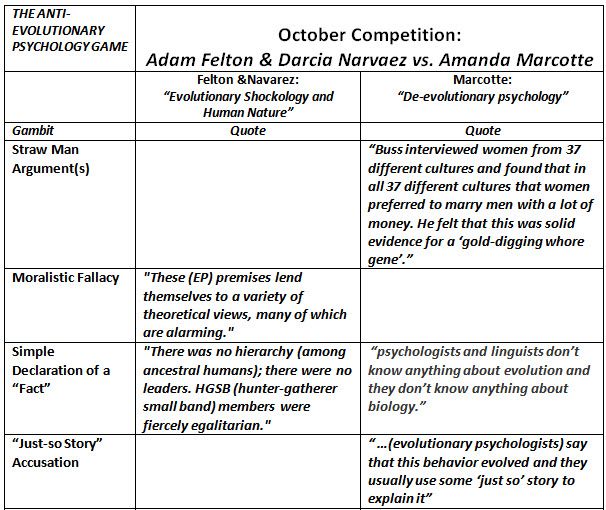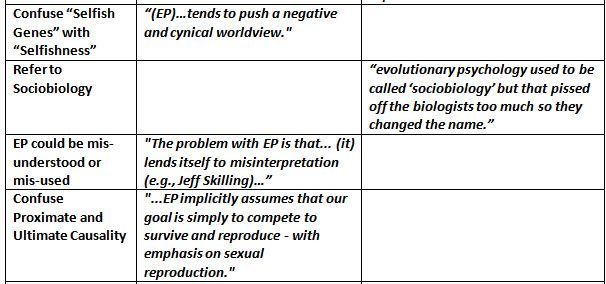Evolutionary Psychology
Playing the Anti-Evolutionary Psychology Game
November Competition:Adam Felton & Darcia Narvaez vs. Amanda Marcotte
Updated June 13, 2024
The majority of climate scientists believe that the evidence supporting anthropogenic climate change is overwhelming. So can you imagine how frustrating it must be for them to repeatedly hear the mis- and dis-information about their discipline from climate change deniers? For some juicy examples of this, see this video clip from Jon Stewart's Daily Show. The mischaracterization of their science, especially from TV talking heads with little actual knowledge of their discipline, probably tests the patience of even the most reserved climate scientists. But, they are human. And, at some point, they probably want to throw open the window, and, as in the film Network, scream at the top of their lungs: "I'm mad as hell, and I'm not going to take it anymore!"
Evolutionary psychologists also must suffer through some incredibly uninformed, hackneyed, and oh-so predictable mischaracterizations of their discipline. The same canards are endlessly repeated; the same rhetorical gambits are repeatedly employed. Evolutionary psychologists are a pretty reserved (even nerdy?) bunch, too. But, sometimes even our limits too are tested.
But, instead of opening the window and screaming (don't want to disturb the neighbors, do we?), how about we have some fun instead? You know, the idea of turning lemons into lemonade. Let's create a contest, based on Robert Kurzban's, The Pop Anti-Evolutionary Psychology Game. We will pit two recent anti-EP articles or speeches against each other. One point will be awarded for each bit of mis- or dis-information about evolutionary psychology (EP) in each article. The one with the most points "wins!"
For the inaugural The Anti-Evolutionary Psychology Game contest we will pit Amanda Marcotte's De-evolutionary psychology speech against Adam Felton and Darcia Narvaez's Evolutionary Shockology and Human Nature blog post.
Ready to play? Ok, here we go. Let's review each article and sort the various anti-EP fallacy quotes from the article or speech into a table. We'll break up the table into a few parts below so we can more easily analyze each of the gambits. At the end we will sum up the points.

Oh my, I don't really have enough room here to go over all of the above gambits in depth. However, I will provide a brief explanation of each, and offer some links for more in depth exploration.
A straw man is an argument based on a misrepresentation of an opponent's position. Contra Marcotte, the study by Buss did not identify a "gold digging whore gene" (say, the GDW-1 gene on Chromosome 23, in homozygous form only). Now, granted, maybe that was a bit of humorous hyperbole by Marcotte, but she apparently didn't really take the time to read Buss' paper (he didn't interview anyone, it was a survey study). And, the results of his massive cross-cultural survey were pretty impressive. For more on this, see Robert Kurzban's post: Amanda Marcotte's Ugly Prejudices.
The moralistic fallacy is the suggestion that what morally ought to be actually corresponds to and places limits on what is. If the world ought not be "alarming," and if some of EP's hypotheses or conclusions are, then EP must be false. Or, at least dangerous. Or, maybe it would frighten small children or adults, and we should not tell them. In the famous words of someone, "Let us hope it is not true, but if it is, let us hope it does not become widely known!"
Proof by assertion. I'll let these quotes as "statements of fact" stand (er... or not) on their own merits. ...oh, I can't resist. There were no hierarchies within ancestral tribes? The psychologist and linguist Steven Pinker knows nothing about evolution?
The "just so story" is such a hackeyed anti-EP canard that it is almost embarassing to see it in print. In other disciplines, such stories are referred to as "hypotheses." Hypotheses by definition are in need of further empirical evaluation. See the article by Barash and Lipton How the Scientist Got His Ideas, as well as Jiro Tanaka's post: Not a Just so Story.

The "selfish genes" metaphor has often been inappropriately equated with personal selfishness. Ironically, a 'selfish' "genes eye view" provides the modern theoretical foundation for the evolution of altruism and cooperation. See John Johnson's recent post for more on this anti-EP fallacy (and others).
EP is sociobiology in disguise. It comes as news to some EP critics that evolutionary psychology is not just 1970s sociobiology reincarnate. There are both subtle and substantive differences. EP characterizes organisms as adaptation executors rather than as fitness maximizers, and thus EP anticipates the effects of ancestral-current environment mismatch. Also, EP focuses more on putative psychological adaptations (emotional, motivational, and cognitive adaptations) rather than overt behavior. Today, the field of sociobiology is more often refered to as behavioral ecology and it focuses primarily on comparative non-human animal behavior.
Potential misuse or misunderstanding of scientific knowledge applies to virtually all areas of science -- nothing new here. And, journalists writing for popular outlets are certainly guilty of taking tentative scientific hypotheses for which there has been reported some initial empirical support and running with it for a sexy headline. But they do that in most all areas of science, perhaps most egregiously in medicine (e.g. "Oil from Snakes -- A New Cancer Breakthrough Discovered by Scientists!"). And, let's give the public a bit of critical thinking credit -- most know that breathless headlines are designed to sell newspapers, magazines and TV shows.

The nature vs. nurture controversy is dead. Nurturists apparently haven't heard the good news, and they continue to paint EP into a naturism corner. No, EP is full-on nature-nurture interactionism. As noted by John Johnson in this post, the nurturists are fighting against a bogyman that exists only in their imaginations
Evolutionary psychology is not behavioral genetics. Talk to the behavioral geneticists if you are looking for genes. And, again, "genetic and not socialized" is a non-sensical phrase that leads us down a road to nowhere.
And... the winner of this month's competition is:
Marcotte wins! (6 points total, to Felton and Narvaez's 5 points)
Next up: a "Hemmingway bad writing contest" inspired competition. Who can write the best anti-EP parody piece from scratch? Now accepting submissions.




